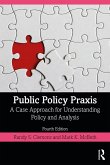Basic Methods of Policy Analysis and Planning presents quickly applied methods for analyzing and resolving planning and policy issues at state, regional, and urban levels.
Divided into two parts--Methods, which presents quick methods in nine chapters and is organized around the steps in the policy analysis process, and Cases which presents seven policy cases, ranging in degree of complexity--the text provides students with the resources they need for effective policy planning and analysis. Quantitative and qualitative methods are systematically combined to address policy dilemmas and urban planning problems. Students and analysts utilizing this text gain comprehensive skills and background needed to impact public policy.
Learning Goals
Analyze and resolve planning and policy issues at the state, regional, and urban level.
Combine quantitative and qualitative methods to address policy dilemmas and urban planning problems.
Product Description
Updated in its 3rd edition, Basic Methods of Policy Analysis and Planning presents quickly applied methods for analyzing and resolving planning and policy issues at state, regional, and urban levels. Divided into two parts, Methods which presents quick methods in nine chapters and is organized around the steps in the policy analysis process, and Cases which presents seven policy cases, ranging in degree of complexity, the text provides readers with the resources they need for effective policy planning and analysis. Quantitative and qualitative methods are systematically combined to address policy dilemmas and urban planning problems. Readers and analysts utilizing this text gain comprehensive skills and background needed to impact public policy.
Features + Benefits
Nine methods chapters with chapter summaries, glossaries and in-text chapter exercises to enhance student-learning (ex. p. iii)
Seven applied policy case chapters derived from real-world examples promote application of course concepts (ex. p. v)
Quantitative and qualitative approaches in a step-by-step process are integrated throughout the text (ex. p. 43)
Extensive discussion of professional ethics in policy analysis and planning introduces students to the ethical implications involved (ex. p. 27)
Analytical graphics are provided throughout the methods chapters for visual examples (ex. p. 39)
Research guidance on web-based data tools and data sources is provided to students to assist analysis and planning (ex. p. 81)
Comprehensive Instructors Manual available for download at www.pearsonhighered.com/irc
PART 1 METHODS
Chapter 1: The Need for Simple Methods of Policy Analysis and Planning
Chapter 2: The Policy Analysis Process
Chapter 3: Crosscutting Methods
Chapter 4: Verifying, Defining, and Detailing the Problem
Chapter 5: Establishing Evaluation Criteria
Chapter 6: Identifying Alternatives
Chapter 7: Evaluating Alternative Policies
Chapter 8: Displaying Alternatives and Distinguishing among Them
Chapter 9: Monitoring and Evaluating Implemented Policies
PART 2 CASES
Chapter 10: Downtown Development
Chapter 11: Defending against Accusations of Discriminatory Housing Practices
Chapter 12: Municipal Garbage: Solid-Waste Collection Methods
Chapter 13: University On Campus Parking Policies
Chapter 14: Emergency Aid for Home Heating Fuel: Developing an Allocation
Formula
Chapter 15: A State Tax on Plastic Shopping Bags
Chapter 16: Public-Private Redevelopment Projects: The Case of Underground
Atlanta
Hinweis: Dieser Artikel kann nur an eine deutsche Lieferadresse ausgeliefert werden.
Divided into two parts--Methods, which presents quick methods in nine chapters and is organized around the steps in the policy analysis process, and Cases which presents seven policy cases, ranging in degree of complexity--the text provides students with the resources they need for effective policy planning and analysis. Quantitative and qualitative methods are systematically combined to address policy dilemmas and urban planning problems. Students and analysts utilizing this text gain comprehensive skills and background needed to impact public policy.
Learning Goals
Analyze and resolve planning and policy issues at the state, regional, and urban level.
Combine quantitative and qualitative methods to address policy dilemmas and urban planning problems.
Product Description
Updated in its 3rd edition, Basic Methods of Policy Analysis and Planning presents quickly applied methods for analyzing and resolving planning and policy issues at state, regional, and urban levels. Divided into two parts, Methods which presents quick methods in nine chapters and is organized around the steps in the policy analysis process, and Cases which presents seven policy cases, ranging in degree of complexity, the text provides readers with the resources they need for effective policy planning and analysis. Quantitative and qualitative methods are systematically combined to address policy dilemmas and urban planning problems. Readers and analysts utilizing this text gain comprehensive skills and background needed to impact public policy.
Features + Benefits
Nine methods chapters with chapter summaries, glossaries and in-text chapter exercises to enhance student-learning (ex. p. iii)
Seven applied policy case chapters derived from real-world examples promote application of course concepts (ex. p. v)
Quantitative and qualitative approaches in a step-by-step process are integrated throughout the text (ex. p. 43)
Extensive discussion of professional ethics in policy analysis and planning introduces students to the ethical implications involved (ex. p. 27)
Analytical graphics are provided throughout the methods chapters for visual examples (ex. p. 39)
Research guidance on web-based data tools and data sources is provided to students to assist analysis and planning (ex. p. 81)
Comprehensive Instructors Manual available for download at www.pearsonhighered.com/irc
PART 1 METHODS
Chapter 1: The Need for Simple Methods of Policy Analysis and Planning
Chapter 2: The Policy Analysis Process
Chapter 3: Crosscutting Methods
Chapter 4: Verifying, Defining, and Detailing the Problem
Chapter 5: Establishing Evaluation Criteria
Chapter 6: Identifying Alternatives
Chapter 7: Evaluating Alternative Policies
Chapter 8: Displaying Alternatives and Distinguishing among Them
Chapter 9: Monitoring and Evaluating Implemented Policies
PART 2 CASES
Chapter 10: Downtown Development
Chapter 11: Defending against Accusations of Discriminatory Housing Practices
Chapter 12: Municipal Garbage: Solid-Waste Collection Methods
Chapter 13: University On Campus Parking Policies
Chapter 14: Emergency Aid for Home Heating Fuel: Developing an Allocation
Formula
Chapter 15: A State Tax on Plastic Shopping Bags
Chapter 16: Public-Private Redevelopment Projects: The Case of Underground
Atlanta
Hinweis: Dieser Artikel kann nur an eine deutsche Lieferadresse ausgeliefert werden.








